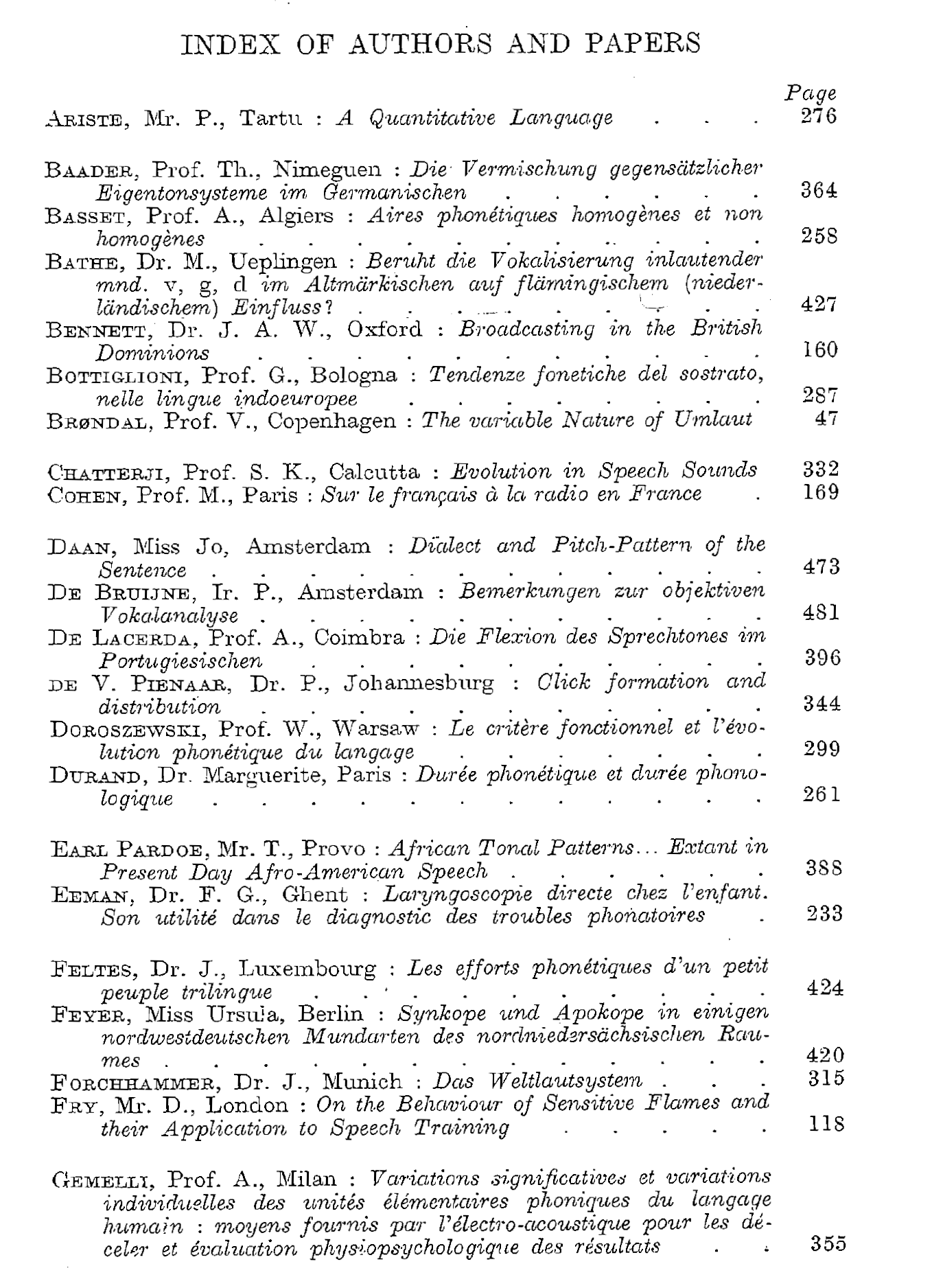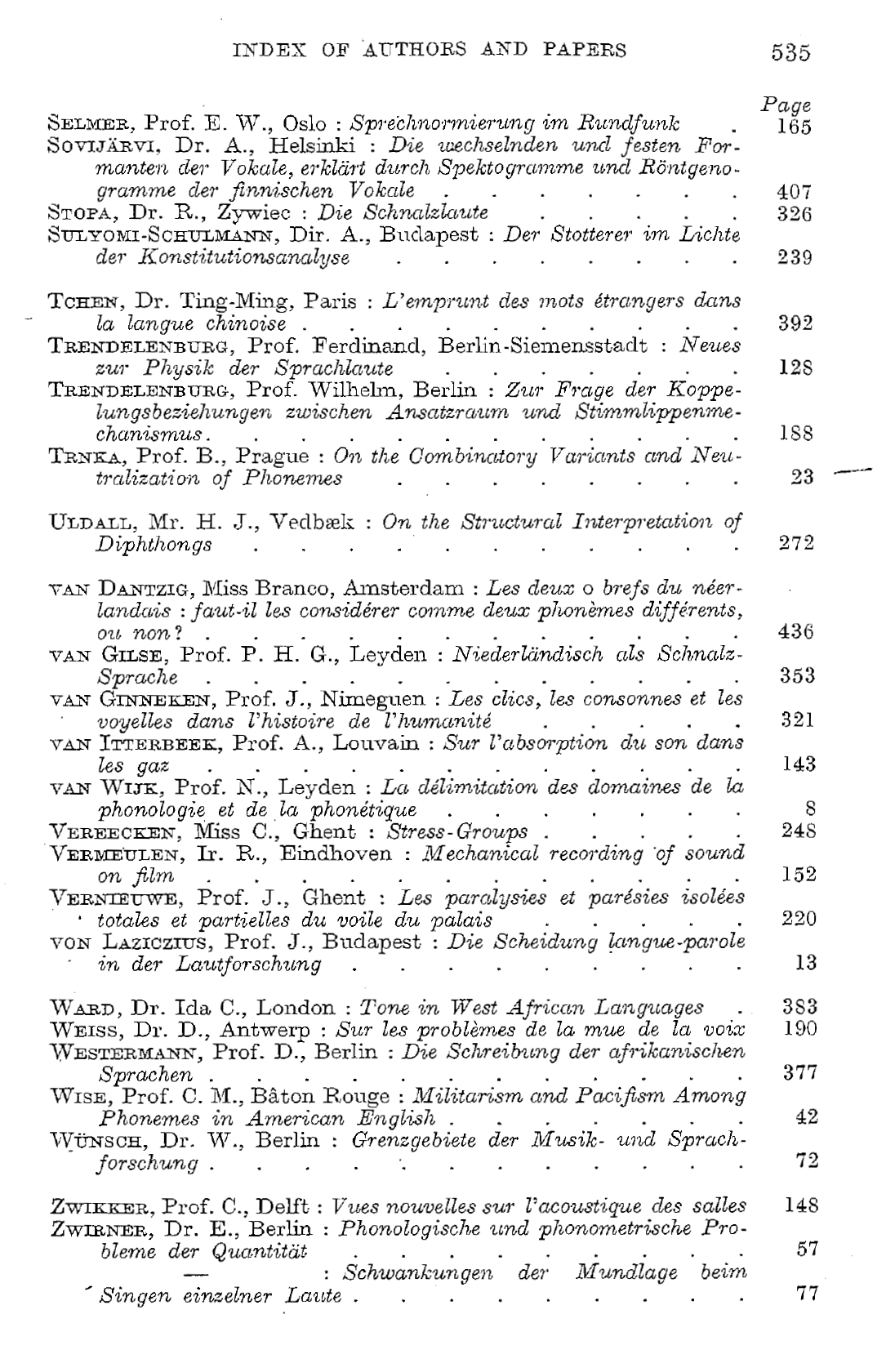ICPhS 1938
« previous post | next post »
For those interested in the history of concepts and techniques in phonetics, I've scanned the Proceedings of the Third International Congress of Phonetic Sciences (1938), all 550-odd pages of it. Warning: 23 MB .pdf file.
The Index of Authors and Papers:



Phillip Helbig said,
July 18, 2019 @ 7:22 am
Small-caps for names of people used to be normal in German, apparently in some other languages as well. When and why did this custom begin and when and why did it die out?
J.W. Brewer said,
July 18, 2019 @ 7:25 am
This is interesting because it adds more detail to the census of English/French/German myl gave in a comment in the prior post and one can look for patterns in which of those "international" languages is used by scholars from countries where the local language is something else. Of course, even in those days, the language prevalent at the university where a given scholar worked was not always that scholar's L1, since some people moved around across international borders for either career-ambition reasons (research specialty was possibly the non-political reason Dr. PENZL had left Vienna for Illinois) or political reasons (which explain both why Prof. JAKOBSON was then in Brno and why he didn't stay there much longer).
On careful reading it looks like there's also one paper in Italian – which on reflection seems a pretty good nominee for a language outside the Big Three that you could "get away with" if you insisted in a way that you might not be able to do with Slovenian or Swedish. Presumably virtually all scholars in the field in those days could read academic French and had had some substantial amount of school Latin in their upbringings, a combination which might make it embarrassing for them to confess an inability to bluff their way through written Italian.
Anne Cutler said,
July 18, 2019 @ 7:30 am
Thanks, Mark, that's a great service! Besides the obvious anachronisms (e.g. being a woman = a marked case) there are some curiosities – the teasingly impenetrable titles of the UK greats (Daniel Jones, Dennis Fry; "Abstract sounds?" "Sensitive flames?"), for instance; something of a fascination with clicks (I assume that Schnalz = click, &someone will tell me if I have that wrong; but – Dutch as a click language???). And it's interesting to see that in those days the Dutch chose more often for French than for English (or German) as a presentation tongue.
Coby Lubliner said,
July 18, 2019 @ 7:56 am
J.W.: In an age when familiarity with classical music was an integral part of Western culture, having some knowledge of Italian was not unusual.
cameron said,
July 18, 2019 @ 9:19 am
It's also interesting how the women's names are represented. In general the authors' names have the form LASTNAME, Title, Initial(s) – but in the case of the female authors they either use a gendered title, (Miss, Mrs.) or they spell out the first name. I'm not sure if they were entirely consistent about this, some of the ones with just initials and a non-gendered title (Dr., Prof., etc.) might be women.
J.W. Brewer said,
July 18, 2019 @ 10:25 am
A few of the men are given the gendered title "Mr.," presumably because no more exalted title would have been apt given their circumstances at the time. The given name rather than initial is used for at least one male with yet another gendered title (PAGET, Sir Richard, where I guess an initial would have been unidiomatic) and there are a few other instances with given names that are, at a minimum, not unambiguously female so I don't know what inference to draw. Two of the Dutchly-named contributors get the title "Ir.," which googling suggests is not a typo for either Mr. or Dr. but an abbreviation for Ingenieur, with a broader scope in Dutch than "engineer" has in English and applicable to holders of master's degrees in a variety of disciplines.
J.W. Brewer said,
July 18, 2019 @ 10:47 am
Separately, for whatever reasons, that usage of initials for males but full given names for females was common in former times. Take as a random example this technical paper about coal published by an agency of the U.S. government in 1947, where all of the official (male) co-authors, including my grandfather R.E. Brewer, are just given their initials, but where the acknowledgements include the following: “Acknowledgment is also made to the following members of the staff of the Central Experiment Station, Bureau of Mines, Pittsburgh, Pa., who cooperated in the investigation: L. A. Turnbull. mining engineer, supervised the sampling of coal at the mine; H. M. Cooper, chemist, supervised the analyses of the coals, cokes, and tars; W. A. Steiner, chemist, assisted with the oxidation tests; J. W. Wilson, scientific aide, assisted with the expansion tests; H. C. Craig and W. E. Erickson, scientific aides, assisted in making the carbonization tests and testing the coke; and Mary H. Cizmarik, clerk-stenographer, assisted in preparing the manuscript.” This particular style, however, omits titles, so you don’t know which of the guys had doctorates and you don’t know whether it was Miss Cizmarik or Mrs. Cizmarik. (Because it’s 2019, googling provides some decent evidence that it was Mrs., but that wouldn’t have helped in 1947.)
https://catalog.hathitrust.org/Record/005979011 (NB that the metadata at the link names one of the authors as “Davis, Joseph Dana 1882,” but in the actual document he’s just J.D. Davis.)
RP said,
July 18, 2019 @ 12:38 pm
Thank you very much for posting this.
This seems to cast light on your earlier query about whether other delegates were accredited to governments.
On page XII, Prof. E. Blancquaert salutes "the government-delegates of the United States of America, Great Britain, France, Germany, Italy, Poland, Holland, Sweden, Denmark, Norway, New-Zealand, Mexico, Portugal, Bulgaria and Luxemburg. I am sure they will not object if I respectfully express to their Governments our sentiments of gratitude for their official representation… It is also a great encouragement for us, to have met with such considerably sympathy from numerous Academies, Universities and other scientific Institutes which have sent delegates: 18 Academies, learned Societies and Radio-Institutes, and 38 Universities" (not just governments)
On page XX, Prof. R. M. S. Heffner is described as "Delegate of the Government of the U.S.A.", and quoted as having "replied to the addresses of welcome on behalf of the Governments who had sent Delegates to the Congress". He refers to "the fifteen Governments here represented".
Christian Weisgerber said,
July 18, 2019 @ 2:21 pm
@Phillip Helbig
You only need to look at the credit scroll of a French movie or TV show to see that the style Firstname LASTNAME is still alive. It serves to disambiguate which is first name and which is last name, because (1) this is not always obvious from the names themselves and (2) both Firstname Lastname and Lastname Firstname ordering can be found.
J.W. Brewer said,
July 18, 2019 @ 2:53 pm
Further to Christian Weisgerber's point, there are some places in Asia where surnames end up in the middle of a full name because the same individual has both a "Western" given name that follows Western order and a Chinese given name that follows Chinese order. So, e.g., the family name of the Singapore politician whose full name is Desmond Lim Bak Chuan is "Lim," and I have seen names of that form printed in business correspondence and the like from that part of the world as, e.g., Desmond LIM Bak Chuan, with the family name in ALLCAPS to minimize confusion.
Ian Maddieson said,
July 18, 2019 @ 3:56 pm
Re Anne Cutler's comment on clicks (and yes "Schnalz" is German for "click"). Both van Ginneken and Stopa had the conviction that clicks were to be found in the original human language and were not writing about Dutch or Polish, although Stopa enlarged the scope of what he considered to be Schnalzlaute to include ejectives, labial-velar stops and a variety of other things. He claimed to have identified cognates in multiple human languages with these sounds in the transcriptions given by Blanche Learned in the book Chimpanzee Intelligence and its Vocal Expressions (Robert M. Yerkes & Blanche W. Learned, 1925, Williams & Wilkins, Baltimore). I haven't yet read what is in this conference paper but I'm sure it will be something weird. Actually Stopa did some of the best early fieldwork on "Hottentot" (i.e. Khoekhoe) before getting rather weird ideas.
Ian Maddieson said,
July 18, 2019 @ 7:50 pm
Another interesting thing in the list of authors' names is the entry:
WISE, Prof C. M., Bâton Rouge.
Claude Merton Wise was (1889-1966) was head of the Speech Department at Louisiana State University in Baton Rouge, Louisiana. I've never before seen that city's name written with a circumflex accent, although of course that is correct in French. I wonder if the editors would have put an accent on Boisé had an author from Boise State University miraculously appeared at the 1938 ICPhS.
J.W. Brewer said,
July 18, 2019 @ 8:45 pm
T. Earl Pardoe of Provo (the location of Brigham Young Univ., where he eventually headed the drama program) was apparently at the time finishing up his Ph.D. in speech at LSU with C.M. Wise as one of his advisers, which probably explains why they both ended up at the same conference with no other American participants except for the Austrian guy who'd accepted an academic post in Illinois.
Bob Ladd said,
July 19, 2019 @ 5:21 am
@ J W Brewer et al.: You don't need to as far back as 1947 to find lists in which women had full first names and men had only initials. When I first arrived at the University of Edinburgh in 1985, the official university staff address lists followed exactly that format. (They also provided home addresses and phone numbers for everyone, which now only 30-some years later feels even weirder than gendered naming conventions.) I can't remember how long that distinction went on, but almost certainly into the 1990s.
Philip Taylor said,
July 22, 2019 @ 10:08 am
I am, almost certainly, demonstrating my age as well as my personal ethos, but while I have no problem with listing men and women alike as (e.g.,) <surname>, <initials> or <initials> <surname>, I would feel very uneasy as referring to a woman solely as <surname>. For me (and perhaps for others of my generation) a woman is always Mrs <surname> (or Miss, or Ms, or Dr, or Professor, or Rev'd) but never just <surname>.
RP said,
July 23, 2019 @ 5:55 pm
I tried posting before but my comment got lost. However, it's interesting to note that several governments sent delegates, including the US. Not just Germany.